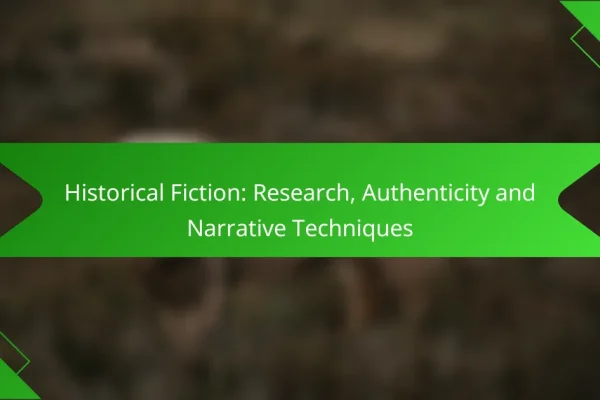How can writing skills improve in fiction genres?
Writing skills can significantly enhance storytelling in fiction genres by focusing on character depth, plot coherence, dialogue authenticity, and immersive world-building. Mastering these elements allows writers to engage readers more effectively and create memorable narratives.
Character development techniques
Effective character development involves creating multi-dimensional characters that resonate with readers. Techniques such as crafting detailed backstories, defining clear motivations, and showcasing character arcs can deepen emotional connections.
Consider using character questionnaires to explore traits, desires, and fears. This can help ensure consistency and depth throughout the narrative. Avoid clichés by making characters unique and relatable, steering clear of stereotypes.
Plot structuring methods
Plot structuring is essential for maintaining narrative flow and reader interest. Common methods include the three-act structure, the hero’s journey, and the snowflake method, each offering a framework for organizing story elements effectively.
When structuring a plot, ensure that each act builds tension and leads to a satisfying climax. Use outlines to map key events and transitions, and be prepared to revise for pacing and coherence. Avoid overly complex plots that may confuse readers.
Dialogue crafting strategies
Crafting authentic dialogue is crucial for character development and advancing the plot. Focus on making dialogue sound natural by reflecting how people actually speak, including interruptions, slang, and varying sentence lengths.
Read dialogue aloud to check for flow and authenticity. Avoid excessive exposition in conversations; instead, let characters reveal information organically. Consider using subtext to convey deeper meanings without stating them outright.
World-building essentials
World-building creates the setting in which your story unfolds, influencing character behavior and plot dynamics. Essential elements include geography, culture, history, and rules governing the world, which should be consistent and immersive.
Start with a clear vision of your world’s key features and how they impact the story. Use sensory details to bring the environment to life, and avoid overwhelming readers with excessive information. Balance exposition with action to keep the narrative engaging.
What are effective writing skills for non-fiction genres?
Effective writing skills for non-fiction genres include strong research capabilities, clear argumentation, and the ability to convey information concisely. These skills ensure that the content is informative, persuasive, and easily understood by the audience.
Research methodologies
Research methodologies in non-fiction writing involve systematic approaches to gathering and analyzing information. Common methods include qualitative research, such as interviews and case studies, and quantitative research, which often utilizes surveys and statistical analysis.
When selecting a methodology, consider the topic and the audience’s needs. For instance, a historical analysis may benefit from primary sources, while a scientific article might rely on empirical data. Always ensure that your sources are credible and relevant.
Argumentation frameworks
Argumentation frameworks help structure non-fiction writing to present ideas logically and persuasively. Common frameworks include the Toulmin model, which outlines claims, evidence, and warrants, and the Rogerian approach, which emphasizes finding common ground.
When constructing arguments, clearly define your thesis and support it with well-researched evidence. Avoid logical fallacies, as they can undermine your credibility. Consider addressing counterarguments to strengthen your position and engage your audience.
Clarity and conciseness principles
Clarity and conciseness are essential principles in non-fiction writing, ensuring that ideas are communicated effectively. Use straightforward language and avoid jargon unless it is necessary and well-defined for your audience.
To enhance clarity, break complex ideas into smaller, digestible parts and use headings and bullet points for organization. Aim for brevity by eliminating unnecessary words and focusing on the main message. A good rule of thumb is to keep sentences under 20 words when possible.
Which writing skills are essential for poetry?
Essential writing skills for poetry include the ability to create vivid imagery, understand rhythm and meter, and have knowledge of various forms and structures. Mastering these skills allows poets to convey emotions and ideas effectively while engaging their audience.
Imagery and metaphor usage
Imagery involves using descriptive language to create mental pictures that evoke sensory experiences. Effective poets often employ metaphors to draw comparisons that deepen meaning and enhance emotional impact. For instance, saying “the night sky was a velvet blanket” creates a vivid image that resonates with readers.
To improve imagery and metaphor usage, focus on specific details and sensory elements. Avoid clichés and strive for originality in your comparisons. Consider creating a list of strong images or metaphors that resonate with your themes to draw from during the writing process.
Rhythm and meter understanding
Rhythm and meter are crucial in poetry as they influence the flow and musicality of the piece. Familiarity with different metrical patterns, such as iambic pentameter or trochaic tetrameter, helps poets create a desired effect. Reading poems aloud can assist in grasping how rhythm impacts meaning and emotion.
Experiment with varying rhythms to find what best suits your message. Consider using a metronome or tapping your foot to maintain a steady beat while writing. This practice can help you develop a natural sense of rhythm in your poetry.
Form and structure knowledge
Understanding various forms and structures, such as sonnets, haikus, or free verse, allows poets to choose the best framework for their ideas. Each form has its own rules and conventions, which can guide the writing process and enhance the poem’s impact. For example, a sonnet’s strict rhyme scheme can create tension and resolution within a limited space.
To effectively use form and structure, study examples of different poetic styles and practice writing within those constraints. This can help you discover your voice while also expanding your creative toolkit. Keep in mind that breaking traditional forms can also yield powerful results, so balance adherence to structure with creative freedom.
How do writing skills differ across genres?
Writing skills vary significantly across genres due to differing conventions, audience expectations, and stylistic elements. Each genre requires unique approaches to structure, tone, and engagement to effectively communicate with its intended audience.
Genre-specific conventions
Each genre has its own set of conventions that dictate how content should be structured and presented. For example, fiction often follows a narrative arc with character development, while academic writing prioritizes a clear thesis and evidence-based arguments. Understanding these conventions is crucial for effective writing.
In genres like poetry, the use of meter and rhyme can be essential, whereas in technical writing, clarity and precision take precedence. Familiarity with these conventions helps writers align their work with reader expectations and enhances overall effectiveness.
Audience engagement techniques
Engaging an audience varies greatly between genres, requiring tailored techniques to capture and maintain interest. In marketing copy, persuasive language and emotional appeals are vital, while in journalism, factual reporting and compelling headlines draw readers in. Knowing your audience is key to choosing the right approach.
For instance, in creative writing, vivid imagery and relatable characters can enhance engagement, whereas in instructional writing, clear steps and practical examples are more effective. Writers should consider their audience’s preferences and expectations to choose the most suitable engagement strategies.
What tools can enhance writing skills?
Several tools can significantly improve writing skills by providing assistance with grammar, organization, and overall clarity. Utilizing the right software can streamline the writing process and enhance the quality of your work.
Grammarly for grammar checks
Grammarly is a widely used tool that helps writers identify and correct grammatical errors, punctuation mistakes, and style issues. By analyzing your text, it offers real-time suggestions to improve clarity and coherence.
When using Grammarly, consider its premium features, which include advanced checks for tone and style. This can be particularly beneficial for professional writing or academic papers where precision is crucial.
To maximize its effectiveness, regularly review the suggestions and understand the reasoning behind them. Avoid relying solely on automated corrections; always apply your judgment to maintain your unique voice.
Scrivener for organization
Scrivener is a powerful writing software designed to help authors organize their projects efficiently. It allows you to break your work into manageable sections, making it easier to navigate large documents.
With features like a corkboard view and outlining tools, Scrivener helps you visualize your project structure. This is especially useful for novelists or researchers who need to keep track of multiple ideas and sources.
To get the most out of Scrivener, spend time setting up your project folders and labels. This will save you time in the long run and keep your writing process focused and organized.









